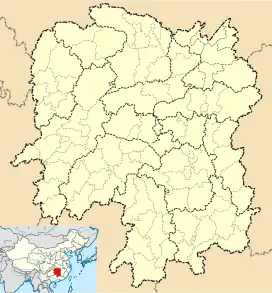Dankou
Dankou (Chinese: 丹口镇) is a rural town in Chengbu Miao Autonomous County, Hunan, China.[1] As of the 2015 census it had a population of 25,800 and an area of 286-square-kilometre (110 sq mi). It is surrounded by Guanxia Town of Suining County on the north, Chang'anying Town on the west, Dingping Township on the south, and Rulin Town on the easth. Because there are many bamboos and trees in the town, it is hailed as "the home of bamboo and wood" (竹木之乡).[2]
Dankou
丹口镇 | |||||||
|---|---|---|---|---|---|---|---|
 Dankou Location in Hunan | |||||||
| Coordinates: 26°21′11″N 110°14′30″E | |||||||
| Country | People's Republic of China | ||||||
| Province | Hunan | ||||||
| Prefecture-level city | Shaoyang | ||||||
| Autonomous county | Chengbu | ||||||
| Area | |||||||
| • Total | 286 km2 (110 sq mi) | ||||||
| Elevation | 700 m (2,300 ft) | ||||||
| Population (2015) | |||||||
| • Total | 25,800 | ||||||
| • Density | 90/km2 (230/sq mi) | ||||||
| Time zone | UTC+08:00 (China Standard) | ||||||
| Postal code | 422505 | ||||||
| Area code | 0739 | ||||||
| Chinese name | |||||||
| Traditional Chinese | 丹口鎮 | ||||||
| Simplified Chinese | 丹口镇 | ||||||
| |||||||
History
In 1995, four townships, namely Dankou (Chinese: 丹口乡), Yangshi (Chinese: 羊石乡), Liuzhai (Chinese: 柳寨乡) and Pinglin (Chinese: 平林乡), merged to form the Dankou Town.
Administrative division
As of 2015, the town is divided into 1 community: Xiatuan Community (Chinese: 下团居委会), and 15 villages: Qianjin (Chinese: 前进村), Shuangshun (Chinese: 双顺村), Qianzhou (Chinese: 潜洲村), Pingnanzhai (Chinese: 平南寨村), Taolin (Chinese: 桃林村), Bianxi (Chinese: 边溪村), Yongping (Chinese: 永平村), Xian'e (Chinese: 仙鹅村), Qunwang (Chinese: 群旺村), Yangshi (Chinese: 羊石村), Shazhouyanmen (Chinese: 沙洲岩门村), Qingtong (Chinese: 青桐村), Xinshi (Chinese: 信石村), Dankou (Chinese: 丹口村), Gonghe (Chinese: 共和村), Hualong (Chinese: 花龙村), Jinyan (Chinese: 金岩村), Taiping (Chinese: 太平村), Beixi (Chinese: 背西村), Shuanglong (Chinese: 双龙村), Longzhai (Chinese: 龙寨村), Yangliu (Chinese: 杨柳村), Dongtoushan (Chinese: 洞头山)
Geography
The town is located in the southwest of Chengbu Miao Autonomous County. It has a total area of 286 square kilometres (110 sq mi), of which 269 square kilometres (104 sq mi) is land and 17 square kilometres (6.6 sq mi) is water.[3]
The Wushui River (Chinese: 巫水河) flows through the town.[2]
The highest point in the town is Mount Niupotou (Chinese: 牛坡头) which stands 1,913 metres (6,276 ft) above sea level.[4]
Climate
The town is in the subtropical monsoon climate zone, with an average annual temperature of 23 °C (73 °F).
Demographics
On December 31, 2015, the National Bureau of Statistics of the People's Republic of China estimates the town's population was 25,800. Miao people is the dominant ethnic group in the town, accounting for 63.95% of the total population. There are also 12 ethnic groups, such as Dong, Yao, Hui and Manchu. Among them, there are 4,400 Han people (17.05%) and 3,300 Dong, Yao, Hui and Manchu people (12.79%).[3]
Economy
Citrus, Myrica rubra, bamboo shoots, gastrodia elata and honeysuckle are famous local products in the town.[2]
Tourist attractions
The former residence of Lan Yu is the birthplace of Lan Yu, a general in the early Ming dynasty (1368–1644). Now it is a historical site in Chengbu Miao Autonomous County.[5][6]
The Baishuidong Waterfall (Chinese: 白水洞瀑布; lit. 'Waterfall of White Water Hole') a famous scenic spot.[4]
References
- 湖南苗乡城步:丹口镇桃林桃花红 [Peach blossom in Taolin Village of Dankou Town, Chengbu Miao Autonomous County]. eastday.com (in Chinese). 23 March 2019.
- Wu Yizhen, ed. (2009). "Dankou Town: Former Residence of Lan Yu" 《蓝玉故里丹口镇》. 《城步苗族自治县概况》 [General Situation of Chengbu Miao Autonomous County] (in Chinese). Beijing: Nationalities Publishing House. p. 236. ISBN 978-7-105-08659-7.
- 城步苗族自治县行政区划 [Administrative divisions of Chengbu Miao Autonomous County]. chengbu.gov.cn (in Chinese). 2017.
- Zhang Hong, ed. (2018). "Chengbu Miao Autonomous County" 《城步苗族自治县》. 《中国分省系列地图册:湖南》 [Maps of Provinces in China: Hunan] (in Chinese). Xicheng District, Beijing: SinoMaps Press. p. 80. ISBN 978-7-5031-8949-4.
- Lei, Xueye (9 May 2017). 苗族大将军蓝玉及蓝玉故里 [Miao general Lan Yu and his former residence]. Chengbu News (in Chinese).
- 蓝玉到底是苗族,回族,还是汉族? [Is Lan Yu a Miao, Hui or Han people?]. Sohu (in Chinese). 10 October 2018.